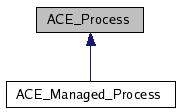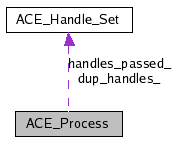ACE_Process Class Reference
Process.
More...
#include <Process.h>
List of all members.
Detailed Description
Process.
A Portable encapsulation for creating new processes. Notice that on UNIX platforms, if the <setenv> is used, the <spawn> is using the <execve> system call. It means that the <command_line> should include a full path to the program file (<execve> does not search the PATH). If <setenv> is not used then, the <spawn> is using the <execvp> which searches for the program file in the PATH variable.
Constructor & Destructor Documentation
| ACE_Process::ACE_Process |
( |
void |
|
) |
|
| ACE_Process::~ACE_Process |
( |
void |
|
) |
[virtual] |
| ACE_Process::ACE_Process |
( |
const ACE_Process & |
|
) |
[private] |
Member Function Documentation
| void ACE_Process::child |
( |
pid_t |
parent |
) |
[virtual] |
Called just after <ACE_OS::fork> in the child's context. The default does nothing. This function is *not* called on Win32 because the process-creation scheme does not allow it.
| void ACE_Process::close_dup_handles |
( |
void |
|
) |
|
Close all the handles in the set obtained from the
| void ACE_Process::close_passed_handles |
( |
void |
|
) |
|
Close all the handles in the set obtained from the
| wchar_t* ACE_Process::convert_env_buffer |
( |
const char * |
env |
) |
const [private] |
| void ACE_Process::exit_code |
( |
ACE_exitcode |
code |
) |
[protected] |
Set this process' <exit_code_>. ACE_Process_Manager uses this method to set the <exit_code_> after successfully waiting for this process to exit.
Return the Process' exit code. This method returns the raw exit status returned from system APIs (such as <wait> or <waitpid>). This value is system dependent.
| ACE_HANDLE ACE_Process::gethandle |
( |
void |
|
) |
const |
Return the handle of the process, if it has one.
| pid_t ACE_Process::getpid |
( |
void |
|
) |
const |
Return the process id of the new child process.
| int ACE_Process::kill |
( |
int |
signum = SIGINT |
) |
|
Send the process a signal. This is only portable to operating systems that support signals, such as UNIX/POSIX.
| void ACE_Process::operator= |
( |
const ACE_Process & |
|
) |
[private] |
| void ACE_Process::parent |
( |
pid_t |
child |
) |
[virtual] |
Called just after <ACE_OS::fork> in the parent's context, if the <fork> succeeds. The default is to do nothing.
Called just before <ACE_OS::fork> in the <spawn>. If this returns non-zero, the <spawn> is aborted (and returns ACE_INVALID_PID). The default simply returns zero.
| PROCESS_INFORMATION ACE_Process::process_info |
( |
void |
|
) |
|
| int ACE_Process::return_value |
( |
void |
|
) |
const |
Return the Process' return value. This method returns the actual return value that a child process returns or <exit>s.
| int ACE_Process::running |
( |
void |
|
) |
const |
Return 1 if running; 0 otherwise.
Launch a new process as described by options. On success, returns 1 if the option avoid_zombies is set, else returns the process id of the newly spawned child. Returns -1 on failure. This will be fixed in the future versions of ACE when the process id of the child will be returned regardless of the option.
| int ACE_Process::terminate |
( |
void |
|
) |
|
Terminate the process abruptly using ACE::terminate_process(). This call doesn't give the process a chance to cleanup, so use it with caution...
| void ACE_Process::unmanage |
( |
void |
|
) |
[virtual] |
Called by a Process_Manager that is removing this Process from its table of managed Processes. Default is to do nothing.
Reimplemented in ACE_Managed_Process.
Timed wait for the process we've created to exit. A return value of -1 indicates that the something failed; 0 indicates that a timeout occurred. Otherwise, the child's process id is returned. If status != 0, it points to an integer where the function stores the child's exit status.
- Note:
- On UNIX platforms this function uses <ualarm>, i.e., it overwrites any existing alarm. In addition, it steals all <SIGCHLD>s during the timeout period, which will break another <ACE_Process_Manager> in the same process that's expecting <SIGCHLD> to kick off process reaping.
| pid_t ACE_Process::wait |
( |
ACE_exitcode * |
status = 0, |
|
|
int |
wait_options = 0 | |
|
) |
| | |
Wait for the process we've created to exit. If status != 0, it points to an integer where the function store the exit status of child process to. If wait_options == WNOHANG then return 0 and don't block if the child process hasn't exited yet. A return value of -1 represents the <wait> operation failed, otherwise, the child process id is returned.
Friends And Related Function Documentation
Member Data Documentation
Handle duplicates made for the child process.
Set of handles that were passed to the child process.
The documentation for this class was generated from the following files:


 1.6.1
1.6.1